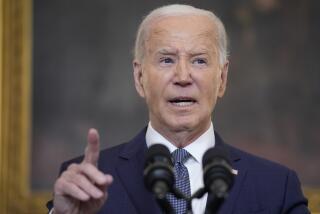The Key Decision Israel Faces : Palestinian Talks Issue Goes to the Core of the Problem
- Share via
The decision that Israel’s 15-month-old coalition government couldn’t bring itself to make may soon be made by the voters instead.
If the Labor Party’s withdrawal from the coalition brings on new national elections--and the next day or so should tell if it will--then the balloting is certain to be dominated by one issue: Should Israel offer to start political talks with Palestinians on terms that are agreeable to Labor, or on terms insisted upon by the Likud Party? Whatever answer the voters give will mark a turning point in Israel’s history.
Labor is ready, in keeping with the finely crafted plan proposed by Secretary of State James A. Baker III, to have an Israeli delegation meet with a Palestinian one in Cairo. This would be preliminary to holding elections in the West Bank and Gaza Strip to pick representatives who would negotiate with Israel about the territories’ future. Labor says it accepts Baker’s idea that one or two of the Palestinians who go to Cairo could be from among those deported by Israel for political activities, and one or two could claim an address in annexed East Jerusalem. These terms are also acceptable to Egypt, which everyone assumes is acting as the Palestine Liberation Organization’s surrogate.
But the terms are emphatically unacceptable to Prime Minister Yitzhak Shamir’s Likud Party. It refuses to negotiate with any Palestinians who claim association with East Jerusalem, and it demands an immediate end to the talks if it smells any hint of PLO influence in them. The Labor-Likud division is thus clear and seemingly unbridgeable.
What that political division reflects as well is the far older and deeper split between those, like Likud, who claim all of historic Palestine as non-negotiably part of Israel and those, like Labor, who are pragmatically prepared to make territorial compromises in exchange for peace. Put on a human level, the ultimate question becomes whether an Israel that seeks to retain its liberal democratic heritage can indefinitely deny political rights to the 1.2 million Palestinians over whom it has ruled since 1967 as a result of the war it did not seek. The immediate consideration is the composition of a Palestinian delegation in Cairo; the more fundamental one is the nature of the commonwealth Israelis hope to have. A decision can’t be evaded much longer.
More to Read
Sign up for Essential California
The most important California stories and recommendations in your inbox every morning.
You may occasionally receive promotional content from the Los Angeles Times.













